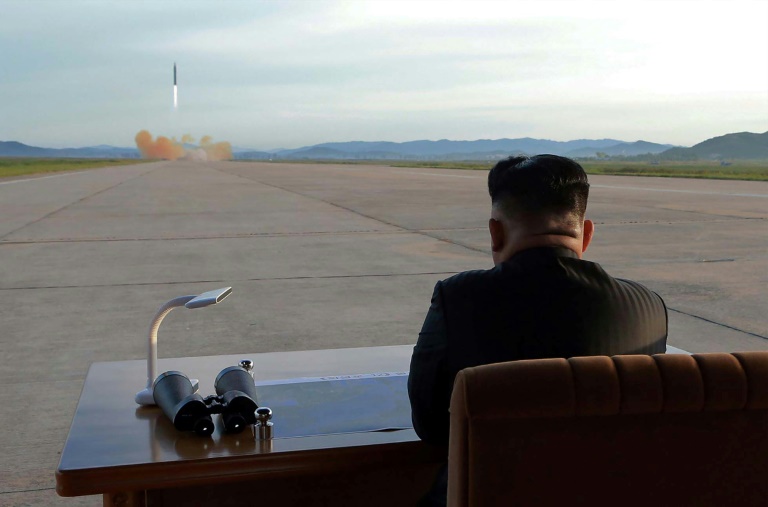The speed of the Olympics-driven rapprochement across the Demilitarized Zone that has divided North and South since the end of the Korean war has been extraordinary.
But how deep it runs, how far it will go and how long it will last once the Games are over remain very open to question, analysts say.
The North has sent its athletes to Pyeongchang, along with cheerleaders and performers, and dispatched a diplomatic delegation led by Kim Yong Nam, its ceremonial head of state, technically its highest-level official ever to visit the South.
Its key member, though, was leader Kim Jong Un’s sister and key confidante Kim Yo Jong, who brought a personal message from her brother and his invitation to South Korean President Moon Jae-in to a summit in Pyongyang.
The offer puts Moon in a quandary, observers say — accept and he risks alienating key ally and protector Washington, decline and his lifelong hopes for engagement could wither.

This undated picture released from North Korea’s official Korean Central News Agency (KCNA) on September 16, 2017 shows North Korean leader Kim Jong-Un inspecting a launching drill of the medium-and-long range strategic ballistic rocket Hwasong-12
“The Olympic outreach is likely intended to widen the already obvious rift between the US (under Trump the ultra) and SK (under Moon the committed engager),” Robert Kelly of Pusan National University wrote on Twitter.
Washington insists that Pyongyang must take concrete steps towards denuclearisation before any talks can begin, while Moon — whose parents escaped from the North in a US evacuation during the war — has long argued for closer involvement to bring it to the negotiating table.
Visiting US Vice President Mike Pence did not engage with the North Korean representatives just a few seats away at the opening ceremony, and did not get up to cheer when athletes from the host nation and its neighbour entered the arena together behind a unification flag.
But Kelly did not expect the alliance between Washington — which has 28,500 troops stationed in the South to defend it from the North — and Seoul to be put at risk.
It “has had way worse ups-and-downs than the ‘lipstick diplomacy’ of the ‘propaganda Olympics'”, he wrote, and Moon was unlikely to be “seriously bowled over by some united squad medals and a trip to Pyongyang”.
“He’s a liberal, not an idiot or a traitor.”
– Joint drills –
Moon carefully avoided either accepting or declining Kim’s invitation, calling for efforts to create “the right conditions” for a trip, and urging Pyongyang to seek an “absolutely necessary” dialogue with the United States.
There have been summits between the two Koreas before. South Korean presidents Kim Dae-jung and Roh Moo-hyun went to Pyongyang in 2000 and 2007 respectively to meet the current leader’s father and predecessor Kim Jong Il.
Similarly many high-profile joint cultural or sporting events were mounted, but the effort failed to stop the North’s weapons push.
North Korea’s cheerleaders wave the Unified Korea flag and cheer during the women’s preliminary round ice hockey match between Switzerland and the Unified Korean team during the Pyeongchang 2018 Winter Olympic Games
To ensure the North’s participation at the Games, this time Seoul persuaded Washington to delay annual joint military drills that always infuriate Pyongyang.
It secured a UN exemption to allow one blacklisted official to travel, and a waiver from US sanctions to enable an Asiana Airlines plane to fly North, while granting one of its own for a North Korean ship that came south.
But analysts expect the momentum to prove fragile and unsustainable once the drills — habitually slammed by the North as a practice for invasion, to which it often responds with missile tests — resume after the Paralympics.
– ‘Treasured sword’ –
Kim Yo Jong is the first member of the North’s ruling family to set foot in the South since the 1950-53 Korean War, and was in the stands with Moon and Kim Yong Nam to support the two sides’ unified women’s ice hockey on Saturday — their first joint team at any Olympics.
But it lost 8-0, and the chances of the dazzling but largely symbolic moves leading to a tangible political breakthrough are almost as remote, analysts say.
Unified Korea’s flagbearers lead the Unified Korea’s delegation as they parade during the opening ceremony of the Pyeongchang 2018 Winter Olympic Games at the Pyeongchang Stadium on February 9
The North is a notoriously tough negotiator, adamant that it needs its “treasured sword” of nuclear weapons to defend itself against the threat of invasion by the United States, and will never give them up.
Just a day before the opening ceremony it held a military parade in Pyongyang, putting its intercontinental ballistic missiles — which can reach the US mainland — on display.
Easing the deadlock is a daunting if not impossible challenge for Moon, said Seoul National University professor Kim Byung-yeon, likening him to an estate agent trying to broker a deal.
“For now the North is asking for a price that is too high, and the US is not willing to buy at that price,” Kim told Seoul’s JoongAng Ilbo daily.
“If the broker tries too hard to convince both sides when the price gap is simply too high, he will end up getting criticised by them both.”
Download our app